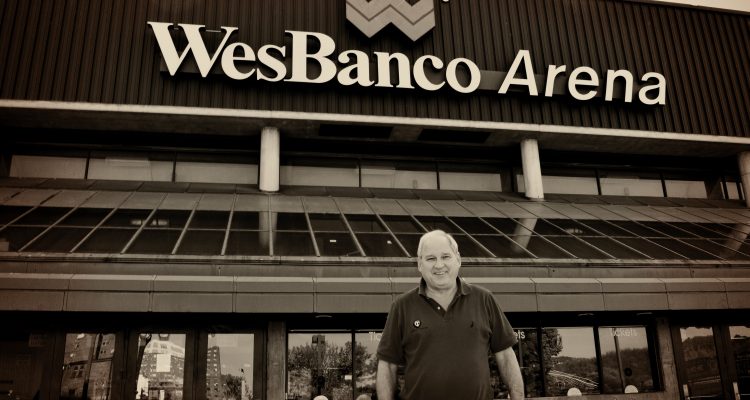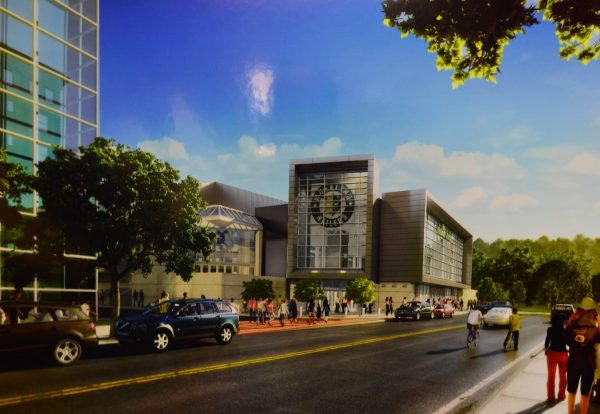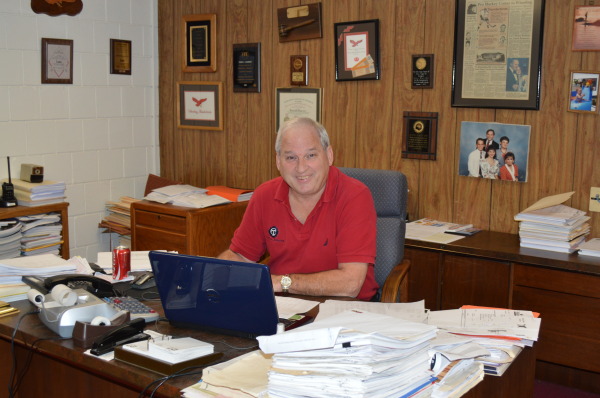Originally published November 23, 2014
Sammy Hagar played Wheeling in the early 1980s. So did Sha Na Na.
Kansas, .38 Special, Def Leppard, Bryan Adams, Molly Hatchet, KISS, Tim McGraw, ACDC, Boston, Heart, Faith Hill, the Doobie Brothers, Bon Jovi, Foreigner, Styx and Alabama.
And the list goes on and on.
Night Ranger, Kenny Rogers, Huey Lewis and the News, Black Sabbath, Poison, Guns n’ Roses, R.E.O. Speedwagon, Blue Oyster Cult, ZZ Top, Dr. Hook, Night Ranger and Cheap Trick.
And the list STILL goes on and on.
When Denny Magruder was hired as the general manager of the Wheeling Civic Center in 1986, he was 38 years old. Cell phones, the Internet and email did not exist, and the Coca Cola Star Lake Amphitheater was still four years away from opening on June 17, 1990, with Billy Joel.
Constructed in 1977, at a cost of $7 million, the Wheeling Civic Center became the home of the Wheeling Thunderbirds in 1991. The big-name bands continued booking shows, and the Harlem Globetrotters, WVU basketball, the annual Toughman Contest, and high school and college hoops were among the frequent features at the venue.
The Wheeling Civic Center rocked, funked, twanged, and literally vibrated throughout the 1980s, but that June day in 1990, when the Burgettstown, Pa., amphitheater opened with a capacity of 22,000, marks the moment in history that changed the entertainment industry forever for Wheeling, W.Va., and for Magruder.
The game suddenly changed for the chief administrator of a small-town arena which seats as many as 7,800 patrons, and since then Magruder has spent a career discovering events with ticket prices affordable for a region of residents enduring the full impact of the Rust Belt era. His performance has attracted much acclaim, and he was inducted into the Wheeling Hall of Fame in 2011.
But criticism has come his way, too.
He’s now 66, the father of three (Rob, Teri and Jennifer), and soon a grandfather of nine. He is embattled, and he is scarred. But he’s still in love.
Novotney: Thanks to Wheeling City Council approving and implementing the ½ percent sales tax, there are funds for capital improvements at Wesbanco Arena. The first upgrade was the $137,000 purchase for a new floor covering events that covers the ice for events.
What’s next for Wesbanco Arena?
Magruder: We’re hoping for the delivery of the new scoreboard to be installed in early January so we can get it up for the second half of the Nailers’ season. And we’re talking about spending three-quarters of a million dollars because that’s what they cost these days.
We want our fans to get the same amenities that all the other fans in other cities get. If you think about it, in Wheeling, this scoreboard will move us forward 40 years. This building opened in the late 1970s, so the scoreboard we have now is older than a lot of the people who come into the building now.”
Novotney: Another amenity that has been in place since the first day is the seating, but plans are in place to replace those, too?
Magruder: We are looking to virtually gut the arena of all its seats that are in there now in June 2015 and replace them all. I hope we can have it completed by the middle of September 2015, and when it is completed, I think the public will be very pleased.
And I can tell you one thing. They will not be orange.
Novotney: Do you know why the color orange was selected as the civic center’s primary color in the 1970s?
Magruder: To be honest with you, I have no idea. But I can tell you this time around we looking at a lot of things in the process of selecting the colors. That’s because today’s world is much more detailed than we were in the 1970s. In the ’70s, orange was in for whatever reason. But now they look into the psychological aspects and what colors are great for blending. The color will complement the environment, and let’s face it; the orange hasn’t blended with anything since the first day.
Novotney: The final renovation planned at this time involves the building’s front façade?
Magruder: A tremendous amount of folks are contributed to that thought process, but what I think we will see is a completely new front of the building with a new lobby that will expand out to the sidewalk. That means all of those steps will be removed.
That means the lobby will be at street level so everyone can roll in and roll out with the safety concerns that the steps presented to all of us. That also means the box office would be on the inside and there would be more room in the expanded lobby for merchandise and different kinds of functions.
And another part of the dream is to make Wesbanco Arena more of a downtown landmark because right now, if you are 14th and Main streets, you may not know there’s even an arena here. By moving the building out, you’ll be able to see the venue much more than you can today.
Novotney: Why are these amenities needed for an arena in a city with a population of 29,000?
Magruder: The building is dated. We all realize that, and what these updates will do is bring the building to the 21st Century. The public wants them. The promoters want curb appeal. Patrons will come, and it will be a new experience for them. It will look like a brand new building when it’s all completed.
Novotney: Why is it that an international superstar like Elton John will perform at Wesbanco, but not many others will?
Magruder: The first factor is Elton John, himself. Elton John has prided himself by playing secondary markets during his career. Every year he tells his people to find him three or four marketplaces like Wheeling, W.Va., so he can feel as if he has reached out during his career to touch all of his fans.
Through the years we have pounded the promoters to give us more of those kinds of shows. Some we’ve been blessed to get, but many we haven’t. The reality is that this business is driven by how many gross dollars you can generate at the gate. So this venue, with between 7,500 to 7,800 seats, has to compete with other venues that have 20-25,000 seats. The math is simple, and it’s a business-generated decision.
Novotney: Have those changes to the entertainment industry placed you under more pressure and scrutiny over the past 10 to 15 years?
Magruder: There’s no question. There definitely has been more pressure.
I think over the past 15 years the corporate world has been become colder and less personal. There are not many handshakes, and that’s because people are much more concerned with how much money they can make. I know making money is always the objective, and it always has been, but I do not like Corporate America today as much as I used to.
Novotney: On two occasions in the past four years, your administrative abilities have been questioned to an extent that you almost walked away. How have you handled those situations?
Magruder: I almost did walk away. That is true.
I think when you get to the twilight of your career, you grow a little more defensive. I do know that this administrative staff has always tried to do what is best for the building and the long-term success of our community.
We have had our ups, and we have had our downs. And when the downs are happening, they are pretty personal. But, like with a lot of other things, when it’s all over, we tend to forget about them.
But sometimes scars remain.
Novotney: You are 66 years old at this time. When do you plan to retire?
Magruder: I know I don’t have the energy I once did, but I like to think I still have the passion, so I’m not ready yet. When that time comes, I guess I’ll know it. That’s what many friends have told me, and I think they are right. I think I will know it. I know I would like to work a few more years, and the good Lord willing that would be my intention.
Novotney: Will you and your wife remain in Wheeling at the time you retire, or do you have plans to move away?
Magruder: My life has been a love affair with Wheeling. My family is here. All my kids live with four blocks of our front door. I have eight grandkids – soon to be nine – and they all live in Wheeling. My world is in Wheeling.







